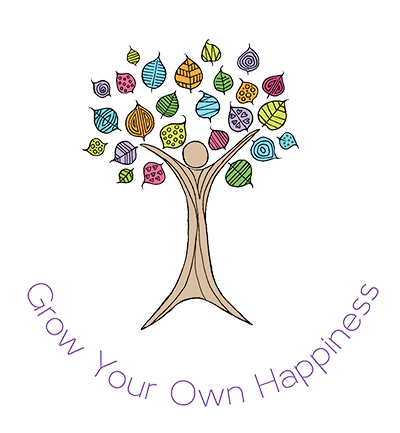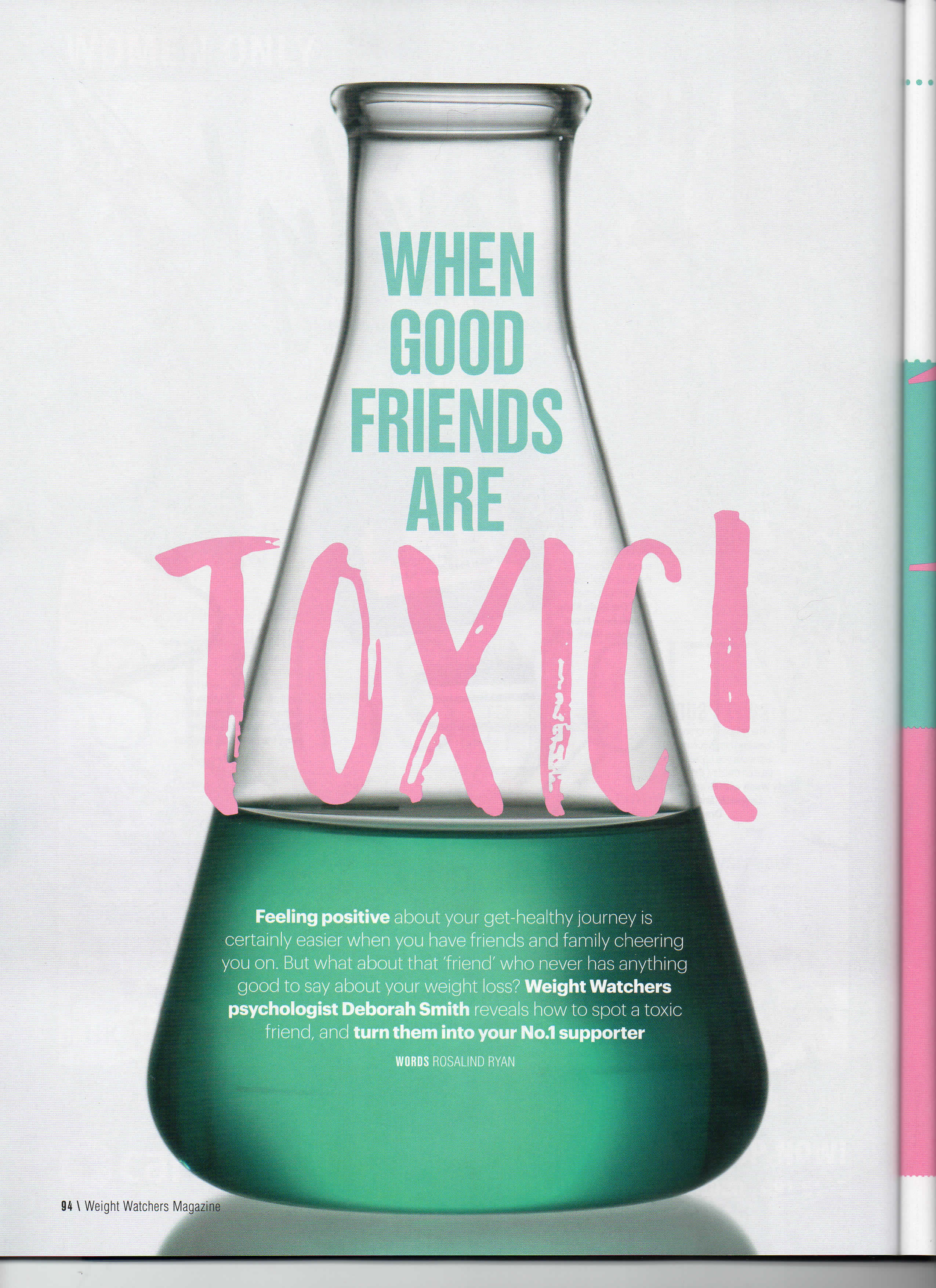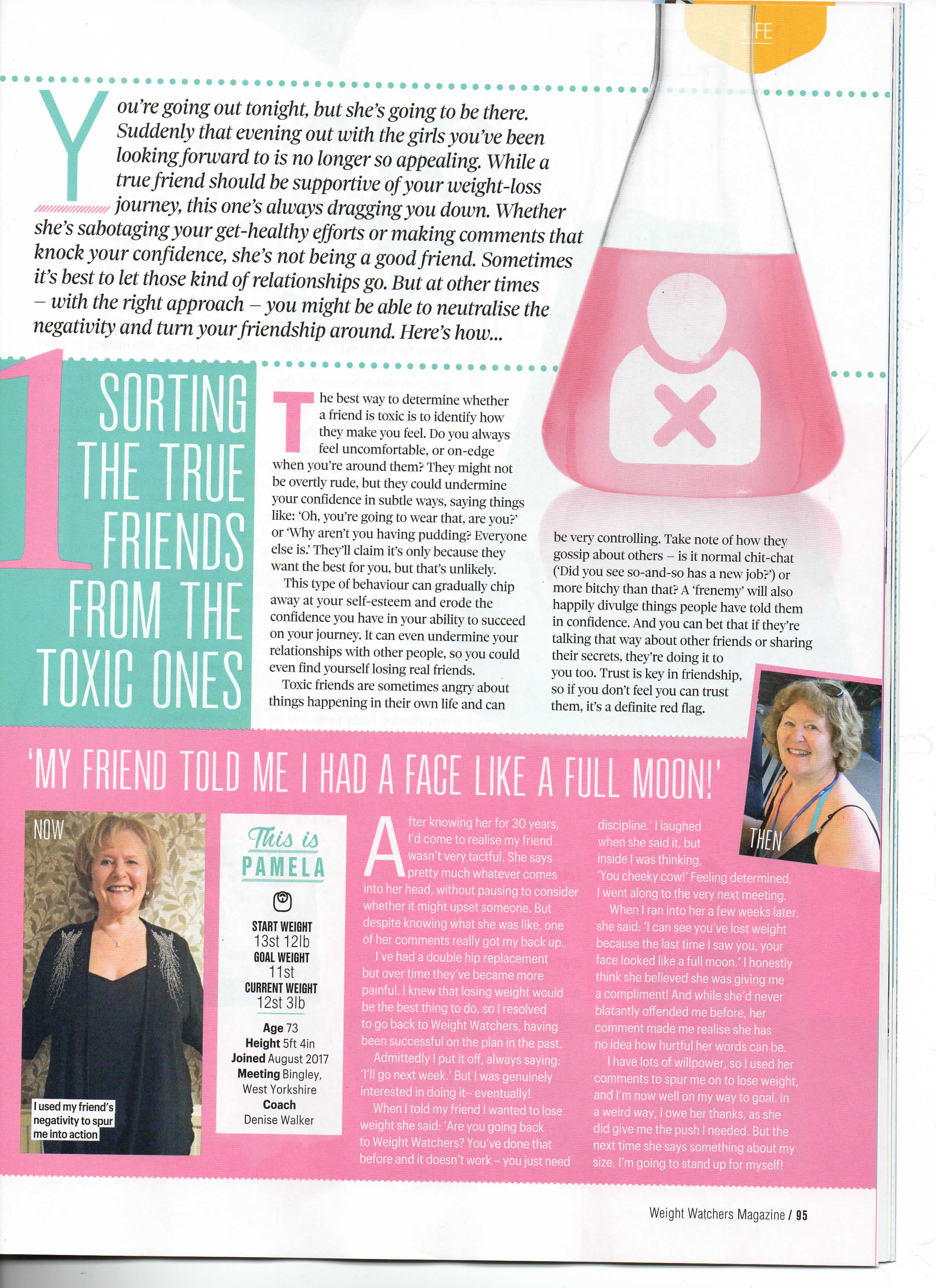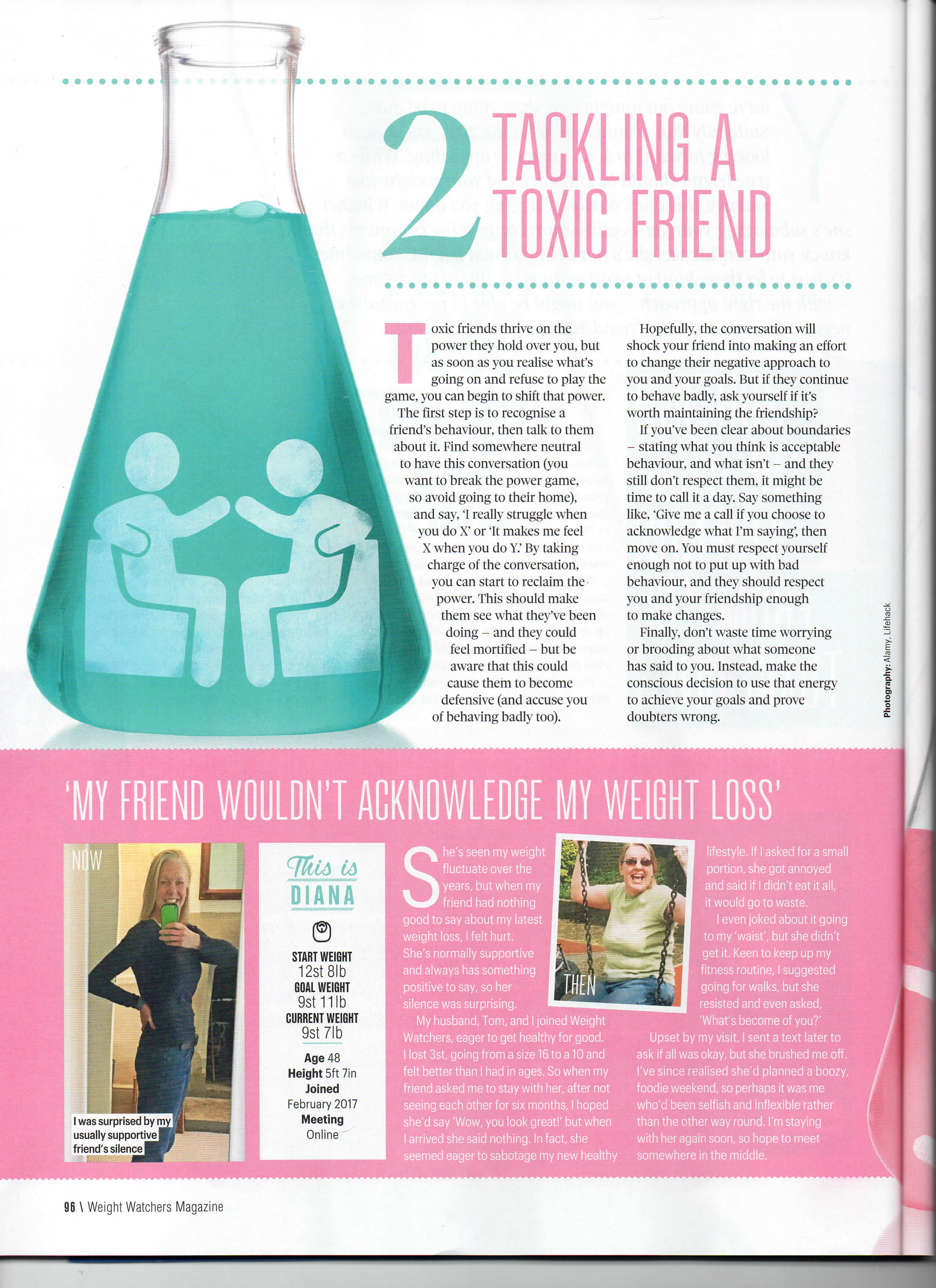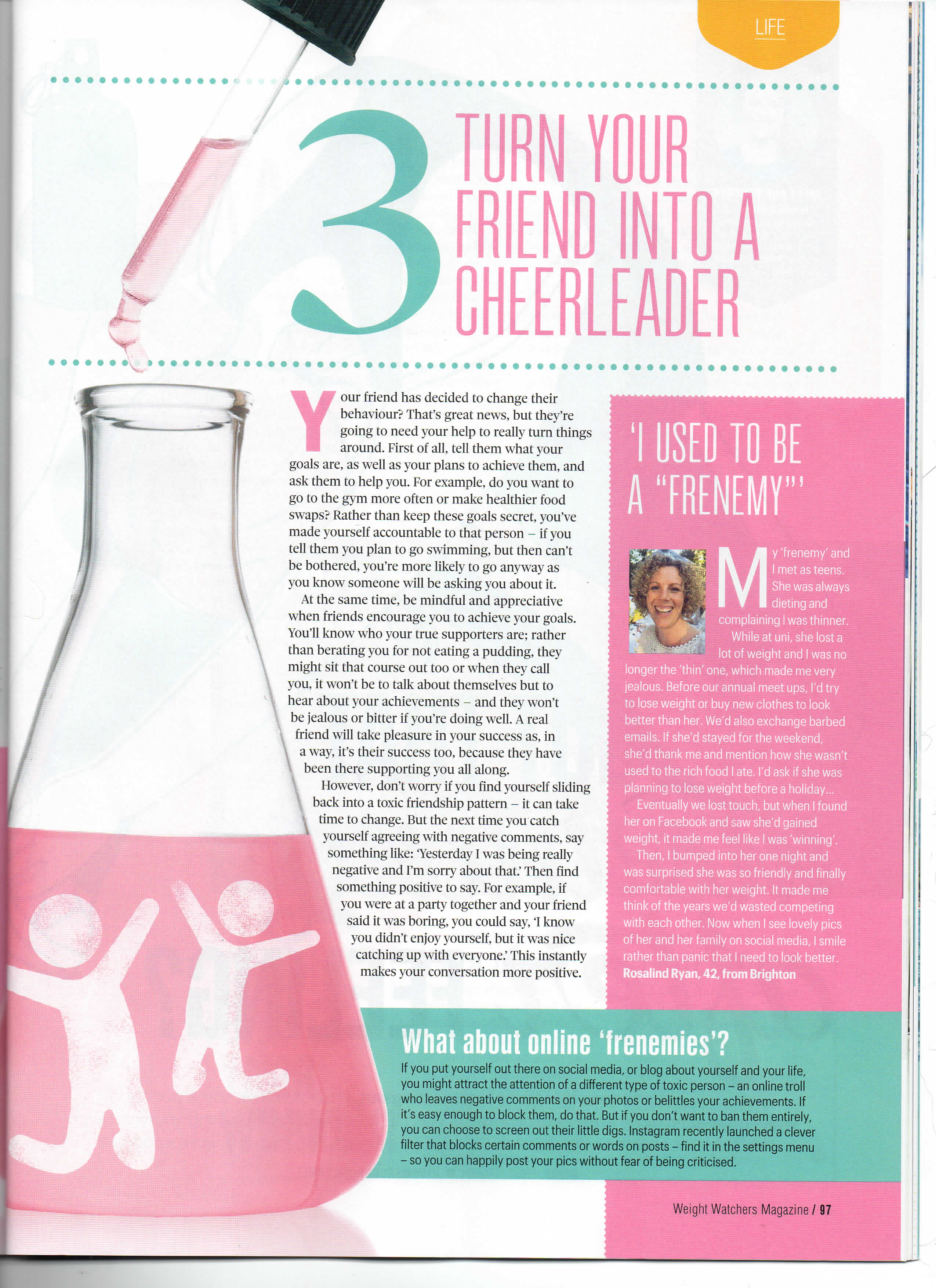Feeling positive about your get-healthy journey is certainly easier when you have friends and family cheering you on. But what about that ‘friend’ who never has anything good to say about your weight loss? Weight Watchers psychologist Deborah Smith reveals how to spot a toxic friend, and turn them into your No.1 supporter
WORDS ROSALIND RYAN
You’re going out tonight, but she’s going to be there. Suddenly that evening out with the girls you’ve been looking forward to is no longer so appealing. While a true friend should be supportive of your weight-loss journey, this one’s always dragging you down. Whether she’s sabotaging your get-healthy efforts or making comments that knock your confidence, she’s not being a good friend. Sometimes it’s best to let those kind of relationships go. But at other times – with the right approach – you might be able to neutralise the negativity and turn your friendship around. Here’s now…
1 SORTING THE TRUE FRIENDS FROM THE TOXIC ONES
The best way to determine whether a friend is toxic is to identify how they make you feel. Do you always feel uncomfortable, or on-edge when you’re around them? They might not be overtly rude, but they could undermine your confidence in subtle ways, saying things like: ‘Oh, you’re going to wear that, are you?’ or ‘Why aren’t you having pudding? Everyone else is.’
They’ll claim it’s only because they want the best for you, but that’s unlikely. This type of behaviour can gradually chip away at your self esteem and erode the confidence you have in your ability to succeed on your journey. It can even undermine your relationships with other people, so you could even find yourself losing real friends.
Toxic friends are sometimes angry about things happening in their own life and be very controlling. Take note of how they gossip about others – is it normal chit-chat (‘Did you see so-and-so has a new job?’) or is it more bitchy than that? A ‘frenemy’ will also happily divulge things people have told them in confidence. And you can bet that if they’re talking that way about other friends or sharing their secrets, they’re doing it to you too. Trust is key in friendship, so if you don’t feel you can trust them, it’s a definite red flag.
2 TACKLING A TOXIC FRIEND
Toxic friends thrive on the power they hold over you, but as soon as you realise what’s going on and refuse to play the game, you can begin to shift that power.
The first step is to recognise a friend’s behaviour, then talk to them about it. Find somewhere neutral to have this conversation (you want to break the power game, so avoid going to their home), and say, ‘I struggle when you do X’ or ‘It makes me feel X when you do Y’. By taking charge of the conversation, you can start to reclaim the power. This should make them see what they’ve been doing – and they could feel mortified – but be aware that this could cause them to become defensive (and accuse you of behaving badly too).
Hopefully the conversation will shock your friend into making an effort to change their negative approach to you and your goals. But if they continue to behave badly, ask yourself if it’s worth maintaining the friendship? If you’ve been clear about boundaries – stating what you think is acceptable behaviour, and what isn’t – and they still don’t respect them, it might be time to call it a day. Say something like, ‘Give me a call if you choose to acknowledge what I’m saying’, then move on. You must respect yourself enough to not put up with bad behaviour, and they should respect you and your friendship enough to make changes.
Finally, don’t waste time worrying or brooding about what someone has said to you. Instead, make the conscious decision to use that energy to achieve your goals and prove doubters wrong.
What about online ‘frenemies’?
If you put yourself out there on social media, or blog about yourself and your life, you might attract the attention of a different type of toxic person – an online troll who leaves negative comments on your photos or belittles your achievements.
If it’s easy enough to block them, do that. But if you don’t want to ban them entirely, you can choose to screen out their little digs. Instagram recently launched a clever filter that blocks certain comments or words on posts – find it in the settings menu – so you can happily post your pics without fear of being criticised.
3 TURN YOUR FRIEND INTO A CHEERLEADER
Your friend has decided to change their behaviour?
That’s great news, but they’re going to need your help to really turn things around. First of all, tell them what your goals are, as well as your plans to achieve them, and ask them to help you. For example, do you want to go to the gym more often or make healthier food swaps? Rather than keep these goals secret, you’ve made yourself accountable to that person – if you tell them you plan to go swimming , but then can’t be bothered, you’re more likely to go anyway as you know someone will be asking you about it.
At the same time, be mindful and appreciative when friends encourage you to achieve your goals. You’ll know who your true supporters are; rather than berating you for not eating a pudding, they might sit that course out too or when they call you, it won’t be to talk about themselves but to hear about your achievements – and they won’t be jealous or bitter if you’re doing well. A real friend will take pleasure in your success as, in a way, it’s their success too, because they have been there supporting you all along.
However, don’t worry if you find yourself sliding back into a toxic friendship pattern – it can take time to change. But the next time you catch yourself agreeing with negative comments, say something like: ‘Yesterday I was being really negative and I’m sorry about that’. Then find something positive to say. For example, if you were at a party together and your friend said it was boring, you could say, ‘I know you didn’t enjoy yourself, but it was nice catching up with everyone.’ This instantly makes your conversation more positive.
When Good Friends are Toxic for Weight Watchers Magazine, 2018
